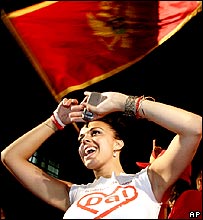
The independence camp has been celebrating in Podgorica
|
Montenegro has narrowly voted for independence from its union with Serbia, near-complete results say. The head of the country's electoral commission said 55.4% of voters had voted to secede from Serbia, just above the 55% required for victory.
The result is set to erase the last vestige of the former Yugoslavia.
The question of independence has deeply divided Montenegro, with its opponents arguing it will damage economic, family and political ties with Serbia.
"Tonight, with the majority decision by the citizens of Montenegro, the independence of the country has been renewed," said Prime Minister Milo Djukanovic.
Serb politicians, Orthodox church leaders and Montenegrins from the mountainous inland regions bordering Serbia broadly opposed secession.
However, ethnic Montenegrins and Albanians from the coastal area largely backed the prime minister and favoured independence.
Mr Djukanovic argued that an independent Montenegro would have a stronger economy and be a better candidate for admission into the European Union.
EU foreign policy chief Javier Solana commended the conduct of the poll and said he would respect the result.
BBC South-East Europe analyst Gabriel Partos says Montenegro will have to wait for reaction from Serbia before the process of proclaiming independence gets under way. Under their union's founding charter, Serbia will become the successor state, and Montenegro will have to apply for membership of the EU, United Nations and other international institutions.
Serbia will also inherit the legal claim to UN-administered Kosovo whose future status is expected to be determined by the end of this year.
Serbia will also lose direct access to the Adriatic Sea, and granting special rights of access will give Montenegro a strong position in forthcoming talks on dividing the union's assets, our correspondent says.
High turn-out
Electoral Commission Chairman Frantisek Lipka said 25,000 votes, about 5% of the total, were still to be counted, but he said they were not expected to affect the outcome.
Final results will be announced at 1900 local time (1700 GMT).
One European Parliament election observer, Robert Evans, told the BBC that everything in the vote had satisfied their requirements.
Indications that the pro-independence bloc may have won the vote prompted celebrations in the Montenegrin capital, Podgorica.
The tooting of car horns filled the city and youths were seen waving the red and gold flag of the old Montenegrin monarchy.
Guns and fireworks were let off in celebration. The turnout in Sunday's poll was 86.3%.
Thousands of Montenegrins living abroad are believed to have returned home to vote.
The country has a population of fewer than 700,000 people, so the vote of the diaspora was considered as crucial by both camps.
Montenegro's loose union with Serbia was established in 2003, replacing what was left of the former Yugoslavia.
Both sides were given the option of electing to leave the union after three years.


~RS~q~RS~~RS~z~RS~00~RS~)